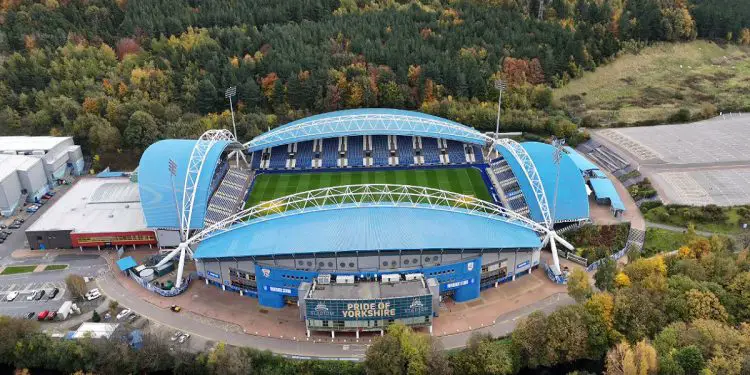The History and Impact of McAlpine Stadium on the Sporting Community and Local Culture

McAlpine Stadium, now known as John Smith’s Stadium, has been a significant landmark in Huddersfield for over three decades. As one of the most iconic sports venues in Northern England, its history is intertwined with the cultural and sporting evolution of the town and its people. From its inception to its modern-day status, McAlpine Stadium has not only hosted thrilling sporting events but has also served as a focal point for community identity, local pride, and economic development. In this article, we explore the history of the stadium, its influence on the local sporting community, and the cultural impact it has had on Huddersfield.
The Origins and Development of McAlpine Stadium
Early Beginnings: From Concept to Construction
The idea for a new stadium in Huddersfield emerged in the early 1990s when the town’s long-standing rugby league and football clubs faced the challenges of aging facilities. At the time, the local football team, Huddersfield Town A.F.C., was playing at Leeds Road, a stadium that had been in use since 1908. However, the aging infrastructure and limited capacity made it clear that Huddersfield needed a modern sports venue to support its teams and attract higher-profile events.
The McAlpine Stadium project, spearheaded by local businessman Sir John McAlpine, aimed to create a state-of-the-art facility that could cater to both football and rugby league. Construction began in 1992, and the stadium opened in 1994, with a capacity of 24,500 seats, which was later expanded to 25,000 in 2010. The innovative design, which featured a fully seated arena and cutting-edge amenities, set the stadium apart from many others in the region at the time.
Key Events and Milestones
Since its opening, McAlpine Stadium has hosted numerous high-profile sporting events, including international rugby matches, concerts, and various football competitions. One of the earliest milestones came in 1994 when Huddersfield Town A.F.C. played its first match at the new venue. The stadium became a symbol of renewal for the town, a place where local fans could gather to support their team and experience the thrill of live sports.
Over the years, the stadium has seen numerous memorable moments. In 2000, Huddersfield Town’s promotion to the Championship (then known as Division One) was celebrated with great enthusiasm by the local community. The stadium was a hub for community pride, drawing in fans from across the region who were eager to see their team rise through the ranks of English football.
But McAlpine Stadium’s influence extended beyond the pitch. It became a venue for rugby league, hosting significant matches for the Huddersfield Giants, the town’s rugby club. The stadium also played host to major concerts, with artists such as Oasis, U2, and Elton John gracing its stage, further cementing its status as a multi-purpose venue.
The Impact on the Sporting Community
Huddersfield Town and Huddersfield Giants
McAlpine Stadium’s most significant influence has undoubtedly been on the sporting community of Huddersfield. The stadium has provided a much-needed home for both Huddersfield Town and the Huddersfield Giants. For football fans, it represented a fresh start and an opportunity to support a modern and ambitious team. The stadium played a crucial role in Huddersfield Town’s rise in English football, with the team regularly competing in the Football League Championship and occasionally battling for promotion to the Premier League.
The Huddersfield Giants, too, have benefitted from the stadium’s facilities, using the venue to host major rugby league matches and create an exciting atmosphere for fans of the sport. The stadium has allowed both teams to grow their fan bases, as it offers a top-tier experience for spectators.
A Hub for Local Sporting Development
Beyond being a home for professional sports teams, McAlpine Stadium has also supported local sporting initiatives. Youth teams and amateur sports organizations have had the opportunity to train and play at the venue, benefiting from the state-of-the-art facilities. This development has played an integral role in fostering a new generation of athletes and sporting enthusiasts in Huddersfield.
The stadium’s ability to host events like the Rugby League Challenge Cup has helped increase the profile of rugby league in the region. In addition, it has become a key venue for local schools, universities, and community groups, providing a space for recreational sports and promoting physical activity across Huddersfield. The positive impact of McAlpine Stadium on the local sporting scene cannot be overstated, as it has created a sense of unity among fans and contributed to the development of various sports in the region.
The Economic and Cultural Impact
The establishment of McAlpine Stadium in Huddersfield has had a profound economic impact on the local area. The stadium has brought thousands of fans to the town, providing a boost to local businesses, including hotels, restaurants, and shops. Match days at the stadium often see a surge in foot traffic and local spending, which has been a boon for the local economy.
Moreover, McAlpine Stadium has played a key role in raising Huddersfield’s profile as a cultural destination. As a venue for both sports and entertainment, the stadium has attracted visitors from outside the region, who come to experience events and concerts. This influx of visitors has helped Huddersfield gain recognition as a vibrant, diverse town with much to offer beyond its industrial history.
While McAlpine Stadium has contributed to Huddersfield’s economy, it has also become a significant part of the town’s identity. The stadium has given the local community a sense of ownership and pride. Whether it’s the fans packing the stands for a football match or the thousands of concertgoers enjoying a performance, McAlpine Stadium has become a cultural landmark, contributing to Huddersfield’s unique character.
McAlpine Stadium and Its Legacy
Community Engagement and Fan Culture
One of the most important aspects of McAlpine Stadium’s legacy is its impact on fan culture. The stadium has long been a gathering place for Huddersfield’s passionate supporters. Fans of both the football and rugby teams have developed a deep sense of community around the stadium, with each match or event representing not just a contest on the field, but a celebration of local identity.
Huddersfield Town’s supporters, for example, have long been known for their loyalty and fervor, with the stadium serving as a place where they can unite, share their passion, and support their team through thick and thin. The same can be said for the Huddersfield Giants’ fans, who view the stadium as a symbol of their club’s rich history and future potential.
For a fun diversion, you might consider exploring various offers like 100 free spins no deposit that allow you to enjoy entertainment beyond the sports world. But when it comes to betting and strategy, it’s always good to seek expert advice from resources like Bonus Experts, which can guide you through the best offers available.
A Venue for Modernization and Future Plans
Looking ahead, the stadium continues to evolve. With significant investments in infrastructure and fan experience, McAlpine Stadium (now John Smith’s Stadium) is positioning itself to remain a key player in British sports. The modern amenities and plans for future renovations ensure that the venue will continue to serve as a top-tier facility for both sports and entertainment for many years to come.
In addition, the club’s association with the stadium has helped create a stronger sense of community engagement. As the stadium moves forward with its development plans, it is clear that McAlpine Stadium will continue to be a central hub for Huddersfield’s sporting culture.
Conclusion
The history of McAlpine Stadium is a testament to Huddersfield’s resilience and passion for sports. From its construction in the early 1990s to its current status as a modern venue for both football and rugby, the stadium has left an indelible mark on the local sporting community and culture. It has helped elevate Huddersfield’s profile, provided a home for local teams, and brought joy to countless fans. The legacy of McAlpine Stadium is not just in the events it has hosted, but in the memories it has created for those who have witnessed history unfold within its walls.
The cultural and economic impact of McAlpine Stadium is a powerful reminder of how sports venues can shape a community’s identity and future. Whether it’s the thrill of a football match or the excitement of a rugby league showdown, the stadium continues to be a beloved landmark for both locals and visitors alike.
In Huddersfield, McAlpine Stadium is more than just a place to watch sports – it’s a reflection of the town’s spirit and its commitment to the future of both its athletes and its people.










